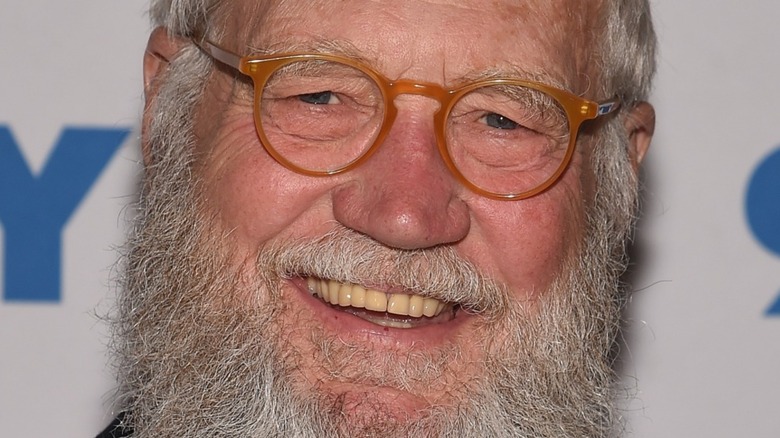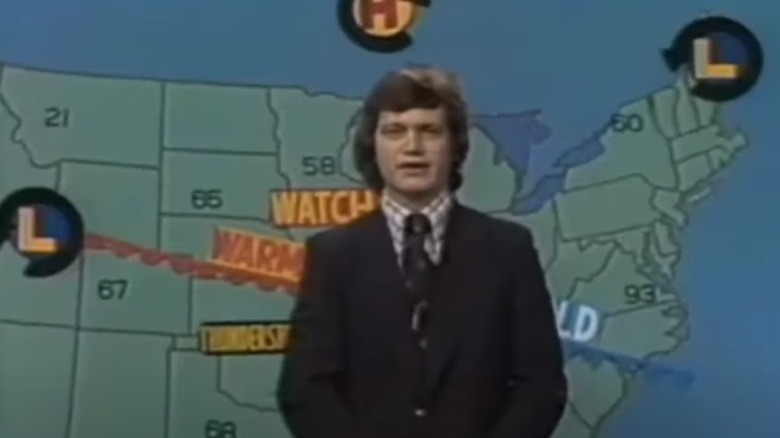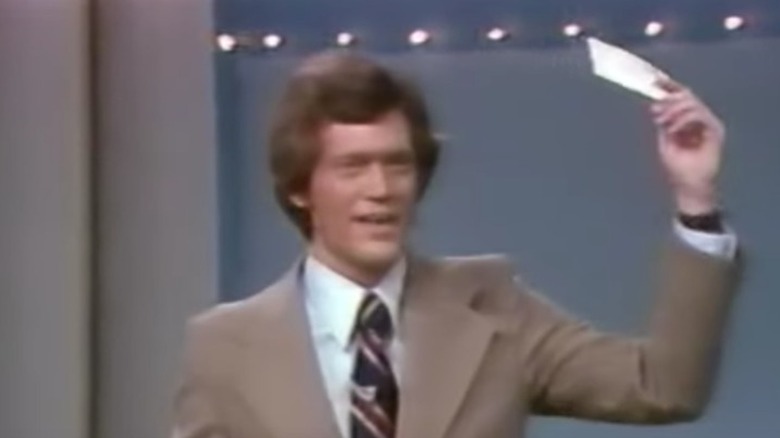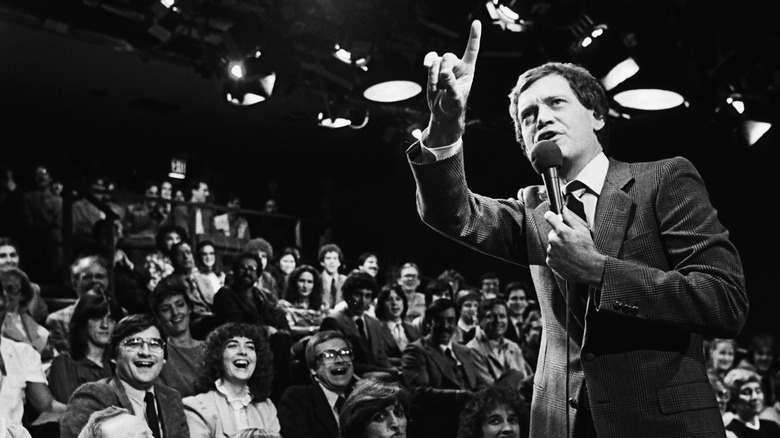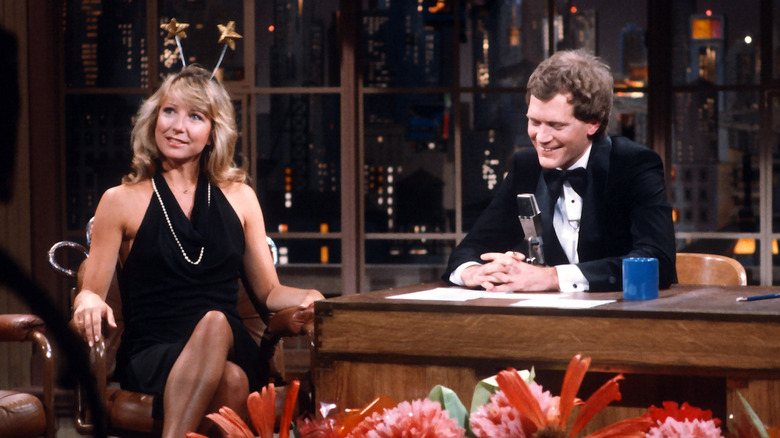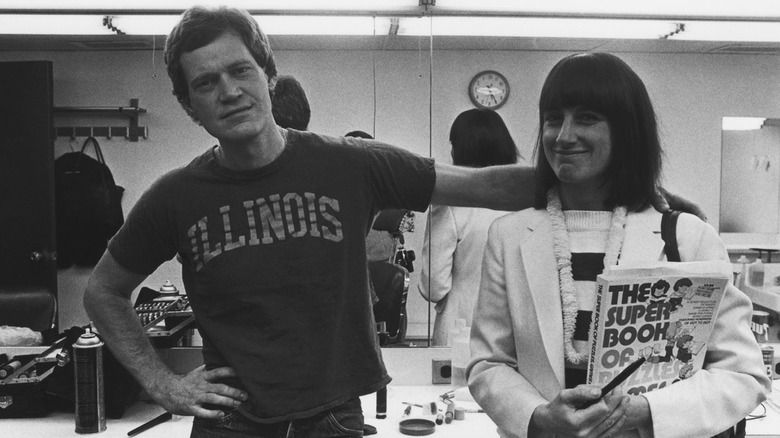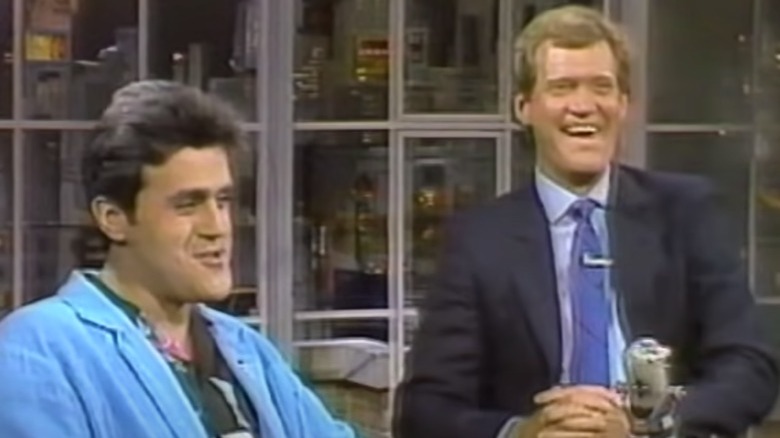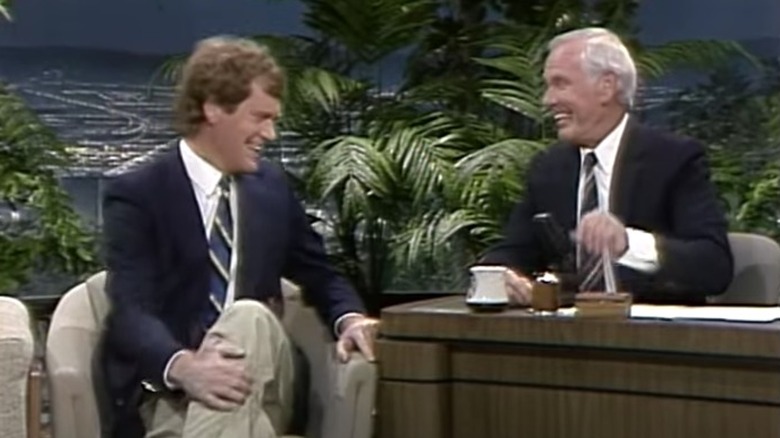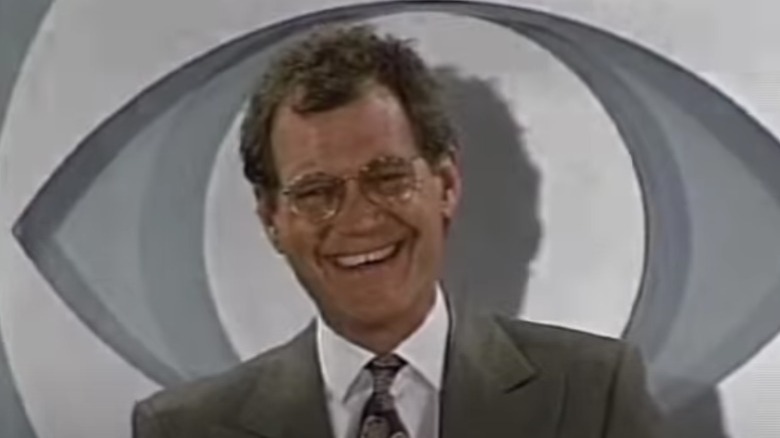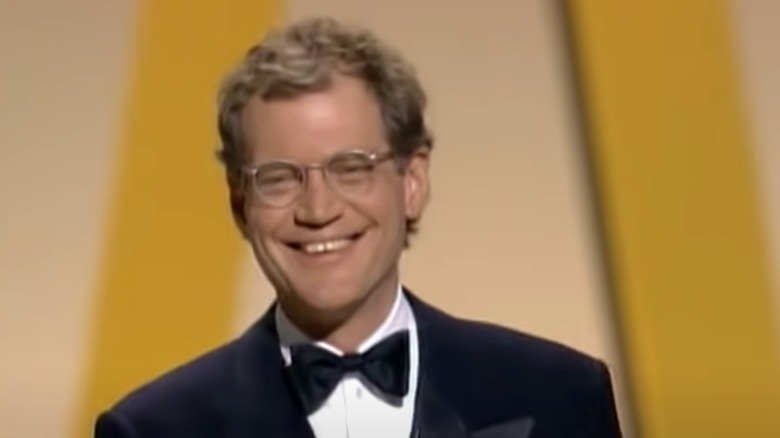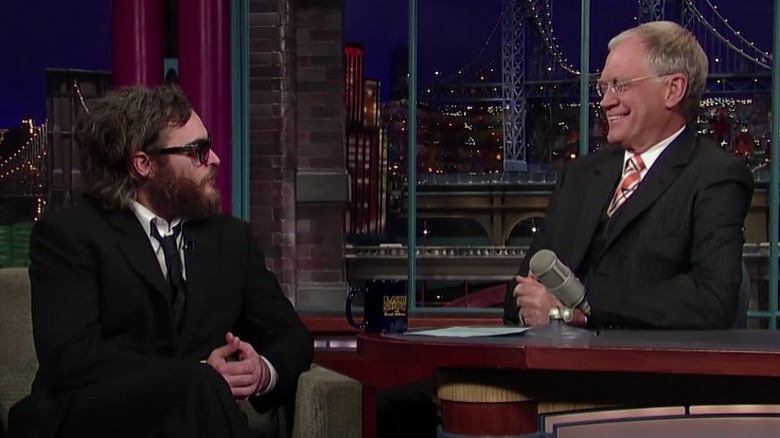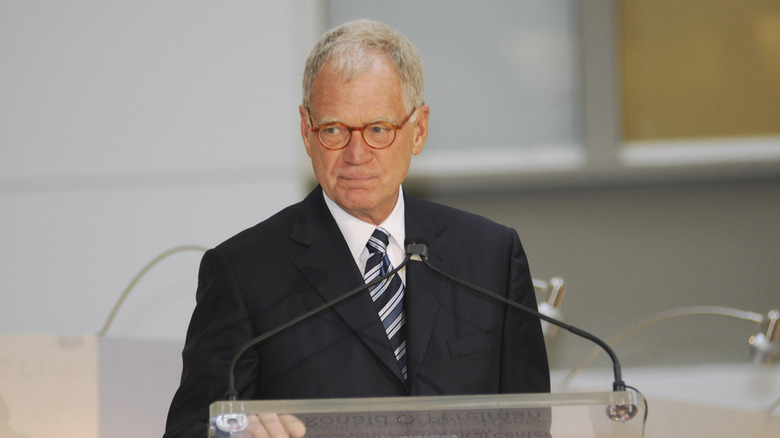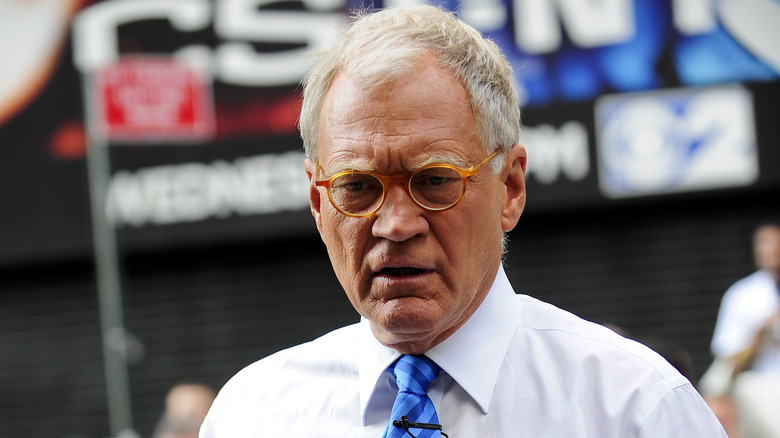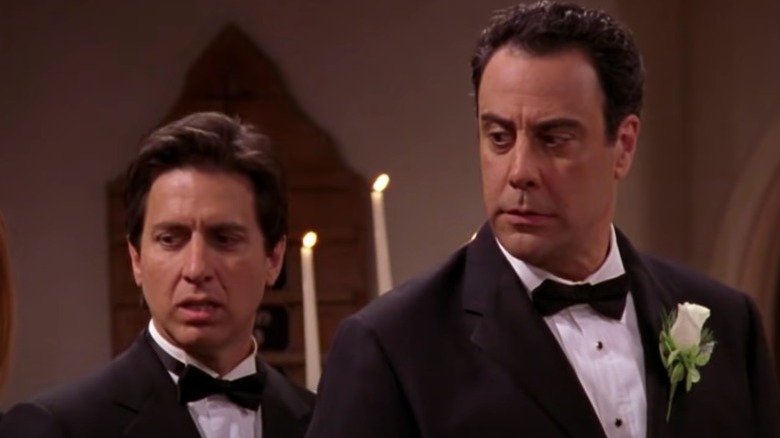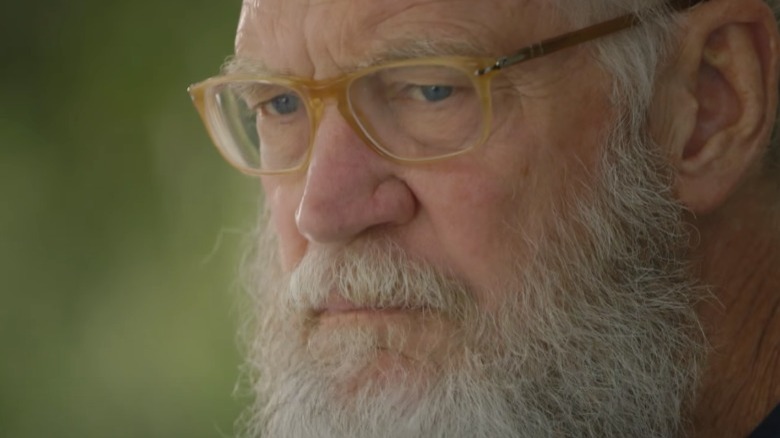The Untold Truth Of David Letterman
David Letterman is a singular figure in American broadcasting. He used the stagnant and cliched late-night talk show formula not only as a framework for entertainment but also as a device to radically subvert that same structure, thus appealing to a new generation of more savvy TV viewers. The staid, old-school Hollywood confines of Johnny Carson-era late-night were forever shattered by Letterman donning a Rice Krispies-laden suit to be dunked in a giant bowl of milk or tossing a series of objects off a five-story building, just for the thrill of watching them explode. Letterman's acerbic yet relatable everyman persona provided a much-needed jolt to the somewhat moribund talk show formula and connected with an audience raised on a steady diet of milder, more conventional TV fare.
Over the course of six decades in the entertainment industry, Letterman made the transition from youthful iconoclast to honored statesman of comedy. His subversive humor altered what it meant to be funny. His career — with its humble Midwestern beginnings, numerous setbacks, and longevity through sheer tenacity — has made him a legend. Some Letterman stories, like his battle with Jay Leno over "The Tonight Show," are so well known they've become showbusiness folklore. Other aspects of his career, such as his early stand-up days or his daytime talk show stint, are now more likely to be overlooked but can still yield significant insights regarding the comedic roots of this unique figure in American TV history.
David Letterman's early career
David Letterman wasn't an overnight success in the entertainment industry. He started his broadcasting career as a student at Ball State University, and even in his broadcasting infancy, Letterman leaned into the absurd and bristled at authority. Letterman's first radio show in 1965 at the Ball State radio station WBST was called "Make It or Break It," where he would ask listeners to call in and give their opinion on the latest pop songs. If they weren't fans, Letterman would actually destroy the record.
By playing popular tunes, "Make It or Break It" was an act of rebellion on the formal WBST, as the programming director refused to play rock and roll music on the station, an alienating move at a time when pop music's influence was ubiquitous in youth culture. While Letterman's show only lasted a few episodes on the stodgy WBST, he remained at the station until too many infractions – like making fun of classical music — ultimately led to his firing.
Although not cut out for college radio, Letterman stuck with broadcasting, moving onto commercial radio and eventually television. He found work at television station WLWI, where he was a weekend weather forecaster, booth announcer, and host of "Freeze Dried Movies" (via Indianapolis Star), a late-night, low-budget film showcase. Despite working for nearly a decade in Indiana broadcasting, by the mid-1970s, Letterman's career was stalling. In order to grow, he needed to move so he left for Los Angeles in 1975.
He could've had a career as a game show host
After moving to Los Angeles in the mid-'70s, Letterman's launch into comedy took many forms. Comedian and game show host Allen Ludden encouraged the move to California and helped Letterman secure work on a number of game shows. And Letterman garnered steady exposure by appearing on these programs — shows with titles like "Password Plus," "The Hollywood Squares," and "The $10,000 Pyramid." It wasn't quite what Letterman wanted to do with his career, however, and according to the book "Letterman: The Last Giant of Late Night," when given the opportunity to host his own game show called "The Riddlers," he had mixed emotions, noting that game shows were "dismissed as wasted time on the network."
During filming of "The Riddlers," Letterman was unnerved by comments made by panelist Jo Anne Worley, who told him, "Well, from this moment on you'll be known as a game show host" ("Letterman: The Last Giant of Late Night"). The pilot didn't get picked up, and despite any previous anxiety about his performance, it actually turned out to be the exposure he needed to get noticed by television executives.
Letterman's first NBC show was a daytime talk show
"Late Night with David Letterman" wasn't the man's first show on NBC. Before he entertained viewers in the twilight hours, he was the best part of waking up, at least for his fans. Letterman's big break in network television arrived in 1980 with a morning talk show, "The David Letterman Show," that ironically replaced several game shows on NBC's daytime lineup. According to the book "Letterman: The Last Giant of Late Night," the series was conceived as a hybrid of existing formats, with Letterman acting as the center holding it all together. But Letterman balked at the idea of a traditional mid-morning program, and "The David Letterman Show ” evolved into a hodgepodge of irreverent comedy, often satirizing the form of daytime television talk shows.
Letterman himself earned critical praise, with the New York Daily News calling his hosting skills "impressive — personable, warm and amusing," but the show itself received a more lukewarm reception. Although not a ratings hit, it laid the groundwork for Letterman's future late-night programming with many writers and regular guests like Steve Martin and Andy Kaufman returning to write and appear on the show (via Esquire). Given its low ratings and a tone that was startlingly not ready for mid-mornings, "The David Letterman Show" lasted less than five months at NBC.
Late Night with David Letterman wasn't an overnight success
While his daytime talk show was short-lived, Letterman now had the attention of important decision-makers at NBC. It's not that executives didn't think Letterman had talent, it's just that his brand of humor wasn't for morning audiences.
Before his own talk show, Letterman had guest hosted "The Tonight Show Starring Johnny Carson" and when Carson announced to NBC his intention to leave his hosting duties in 1979, Letterman was among the names bantered about as Johnny's replacement (via "Letterman: The Last Giant of Late Night"). Carson ended up not leaving the network or his show, instead negotiating a massively lucrative deal to stay, which included ownership of the one-hour time slot after "The Tonight Show" (via The Hollywood Reporter). And with the cancelation of "Tomorrow with Tom Snyder" in 1981, Carson and Carson Productions swooped in and gave Letterman another shot at hosting by creating "Late Night with David Letterman."
"Late Night with David Letterman" debuted on February 1, 1982, with critics noting that "Letterman's fast-paced, off-the-wall comedy style was better suited to the ambience of late night — and its younger audience" (via New York Times). Although hopes were high, the success of the show was never certain. During its first year, "Late Night" received a very limited number of episode orders, with Deadline explaining that NBC "was giving them small green lights of no more than six weeks at a time." However, the network eventually realized the show was going to be a hit and the episode orders kept rolling until 1993.
His creative partnership with Merrill Markoe
Letterman's broadcasting talents speak for themselves, but his comedy career wouldn't have been nearly as legendary without his collaboration with writer/producer Merrill Markoe. A former art professor, Markoe moved to Hollywood to pursue writing. She met Letterman at The Comedy Store in L.A. in the '70s, where they were both up-and-coming writers seeking industry exposure by performing stand-up comedy. In addition to helping each other professionally, they also become involved romantically.
Eventually, Markoe was hired by Letterman as the head writer of "The David Letterman Show," and her wry, absurdist humor set the tone for the program and Letterman's subsequent television persona. During her time on "The David Letterman Show," Markoe created the enduring segment "Stupid Pet Tricks," where animals and their owners would perform peculiar stunts. A seemingly endless well of comedic inspiration, "Stupid Pet Tricks" remained part of Letterman's comedy repertoire for decades.
After the cancelation of "The David Letterman Show," Markoe was made the first head writer of "Late Night with David Letterman," where her decisions and hires were crucial. However, she would step back from her leadership role to maintain her personal relationship with Letterman (which would come to an end in 1988). While no longer in charge, she remained on the writing team and became known for her "remote" pieces like "Dog Poetry." Markoe was part of a writing team that won three writing Emmy Awards for "Late Night," a feat never again matched once Markoe finally left the show in 1986.
He helped revive Jay Leno's sagging comedy career
David Letterman and Jay Leno had different performing styles, with Letterman leaning into wordplay and Leno into stage presence, but they had mutual admiration. During the 1970s, the two comedians — along with many other funny people of the time — worked at The Comedy Store, not only to hone their craft but also to be seen by talent bookers from "The Tonight Show Starring Johnny Carson." A chance to perform a set on "The Tonight Show" could make or break careers. And they both got their chance to do their sets in front of Carson's rainbow curtain, with Leno's first "Tonight Show" appearance in 1977 and Letterman following in 1978.
However, their careers took different turns. By the early '80s, Letterman was successfully hosting "Late Night" while Leno's comedy career was stalling. Leno was no longer being invited on "The Tonight Show," and his acting resume was dotted with minor sitcom appearances like "Laverne & Shirley" and "Alice." Being invited as a guest on "Late Night" gave Leno's career a much-needed jolt of energy and national exposure. As explored in CNN's "The Story of Late Night," beginning in 1982, Leno made regular appearances on "Late Night," and Letterman and Leno's chemistry was undeniable. Leno crafted his act to play into Letterman's comedic sensibilities, getting many hearty chuckles out of the host. These "Late Night" segments put Leno back onto NBC executives' radar, and he was asked to return to "The Tonight Show," being offered to guest host the show on a regular basis starting in 1986 and eventually becoming the show's permanent guest host.
He was heir apparent to host The Tonight Show ... until he wasn't
Throughout the 1980s, Letterman's successful hosting of "Late Night" was seen as a soft launch into one day hosting "The Tonight Show." While Johnny Carson had hosted since 1962, he almost quit the show in 1980. Names of successors had been bantered about throughout the decade, but it was Letterman who had the time slot immediately after "The Tonight Show." Plus, "Late Night" was produced by Carson Entertainment and received critical accolades, including multiple Emmys and a Peabody. Given these circumstances, many thought the path to succession was clear and Letterman would slide into hosting "The Tonight Show" upon Carson's retirement. It was Letterman's gig to lose.
But at the same time "Late Night" was thriving, Jay Leno was fine-tuning his comedy to fit the mainstream sensibilities of "The Tonight Show." After earning his spot as the show's permanent guest host, Leno finally had the attention of NBC executives. And with this renewed interest, Leno negotiated a "secret deal" with NBC. As part of his deal to continue as guest host, Leno's contract guaranteed him hosting "The Tonight Show" when Carson stepped down (via People). Letterman had been courted for the job since the late 1970s, but by the time Carson announced his retirement in 1991, some NBC executives had soured on the idea of Letterman as the face of "The Tonight Show." There were doubts Letterman could soften his acerbic edges, and his acidic off-screen attitude rubbed executives the wrong way. Leno was announced as host of "The Tonight Show" in June 1991 (via Baltimore Sun), officially taking over for Johnny Carson on May 25, 1992.
Letterman was forced to make creative pivots on CBS
"The Tonight Show" was Jay Leno's show, but even after Leno was announced as the permanent host, Letterman still lobbied NBC for the job and the 11:30 p.m. ET time slot. Unfortunately for Dave, NBC wasn't willing to meet his terms. However, his talents were still in high demand, and rival network CBS saw Letterman's displeasure with NBC as an opportunity to stake their claim in the lucrative night-time hours. For all its storied broadcasting history, CBS never had success in late-night programming. Noting Letterman's vocal disappointment in losing "The Tonight Show," CBS stepped in with a lucrative deal for Letterman that was unprecedented in its scope.
CBS announced their partnership with Letterman in a high-profile press conference in January 1993. His three-year deal with the network would earn him about $42 million, compared to the annual salary of Leno, which at the time was estimated to be between $3 million to $8 million (via New York Times). In addition to his salary, Letterman owned his new CBS show, and similar to Johnny Carson's "Tonight Show" deal, he had the option to produce the show after his. CBS was so invested in creating their late-night franchise that they bought and renovated the Ed Sullivan Theater in New York City specifically so that Letterman would stay in the city (via New York Times).
His panned Oscar-hosting gig
In what Letterman himself has dubbed "the single biggest professional embarrassment of my life" (via The Hollywood Reporter), his hosting stint at the 67th Academy Awards has become known as a legendary flop. Letterman kicked off his hosting duties with "Oprah, Uma, Uma, Oprah," an absurd joke where he excitedly introduced Oprah Winfrey and Uma Thurman to each other by their first names, the punchline only being their similar-sounding monikers. It fell flat, and the film stars in the audience politely chuckled as Letterman moved his monolog along.
But like many of his jokes, Letterman ran it into the ground, referencing "Oprah, Uma" a half dozen more times throughout the ceremony. That Letterman would make this non-joke the centerpiece of his hosting gig is all the more surprising given the fact that he and Winfrey were in the midst of a long-standing feud, with the two not on speaking terms. The "Oprah-Uma" riff is still remembered as one of the great cringe-worthy moments in pop culture and has a notorious legacy. Despite the perceived failure, Letterman told The Hollywood Reporter he was subsequently asked two different times to host the Oscars. Letterman declined both offers.
Letterman's interview style brought out the best and worst in his guests
Although he was a natural broadcaster, it took time for David Letterman to warm up to interviewing. According to "Letterman: The Last Giant of Late Night," early reviews of "Late Night" agreed that Letterman wasn't great at celebrity interviews. This was an issue because talk shows historically served as an attention-getting platform for celebrities with projects to sell. However, Letterman actively disliked doing showbiz interviews, and he didn't hide his disdain for sycophantic celebrity culture. Letterman's rude reputation was so well-known that in 1986, Cher called out Letterman with an expletive.
As time passed, Letterman's interview style softened, and his couch became a place where celebrities could relax, perhaps a little too much. In 1994 on "The Late Show," Madonna famously swore up a storm, saying the F-word 14 times, making Letterman visibly uncomfortable. In 1995, Drew Barrymore leapt atop Letterman's desk, performed a slinky dance, and flashed him her breasts, a celebratory treat for his 48th birthday. Barrymore told Entertainment Weekly (via ET) of Letterman's relationships with celebrities, "The more you tried to charm him, the less he wanted it. He either liked you or he didn't."
Perhaps Joaquin Phoenix had heard this about Letterman before his 2009 guest turn on the show when he appeared in a disheveled and uncommunicative state, seemingly a celebrity on a downward spiral. Unbeknownst to Letterman, Phoenix was "performing" a version of himself for his 2010 mockumentary "I'm Not Here." Phoenix returned to "The Late Show" to apologize for the deception, which Letterman received graciously.
He made his health concerns part of his show
In 2000, David Letterman suffered a health scare that almost took his life. Having a family history of heart disease, Letterman made fun of his high cholesterol and his resulting penchant for oat bran. During a hospital visit for tests, doctors discovered Letterman's heart was in such dire condition that quintuple bypass surgery was performed on him that same afternoon (via New York Times).
Letterman took a five-week hiatus from "The Late Show," with a series of celebrity guest hosts continuing the show without him. Upon his return to the desk, Letterman made his heart surgery the star of the show. He entered the stage flanked by two nurses and started his monologue by saying, "Wait 'till you hear what happened to me." Letterman then brought out his entire medical team, thanking them for their service. He continued to weave the experience into subsequent episodes, with the health scare becoming part of his persona. But his relationship with his doctors wasn't just for show. In a 2008 interview with Rolling Stone, Letterman shared that he'd hosted a doctor and nurse from his heart surgery team at his Montana home, saying they were among his best friends.
Letterman's absence from "The Late Show" revitalized the program. The medical episode revealed Letterman's vulnerability, so often hidden behind his snarky exterior. It also re-introduced the tradition of late-night guest hosts, the same practice that gave Letterman his start, and Kathie Lee Gifford, Dana Carvey, and Janeane Garofalo infused "The Late Show" with new comedic energy.
David Letterman and the extortion plot
David Letterman's relationship with women is complicated. During a time when it was incredibly difficult for women to attain power positions in entertainment, Merrill Markoe was the head writer for both "The David Letterman Show" and "Late Night with David Letterman." Markoe's comedic voice drove the innovation of Letterman's humor. However, Markoe's female leadership didn't evolve into any long-term gender equality in the writer's room. Markoe was the only female writer for the Letterman staff until Nell Scovell joined the show in 1990, with Scovell quitting the job after less than half a year on duty. Her departure was largely due to the sexist culture of the "Late Night" production, with Letterman himself setting the tone.
When Letterman revealed in 2009 that he had slept with female staffers, it shocked the public. He made the announcement on air during his show, detailing how he was blackmailed for $2 million by someone who knew of his inappropriate sexual relationships. The extortion plot failed, and Robert Halderman — the boyfriend of Stephanie Birkitt, a staff member Letterman was sleeping with — pleaded guilty to attempted grand larceny and served four months in prison. Birkitt, who appeared in many "Late Show" skits as "Dave's assistant," has been all but erased from the show's legacy.
Since "The Late Show" ended in 2015, there has been a reassessment of Letterman's legacy pertaining to his treatment of women. Scovell has been a vociferous critic of Letterman's workplace transgressions, even confronting him for a piece in Vanity Fair in 2019. When Tina Fey called him out for not hiring female writers, Letterman's reply of thinking women didn't want to write for his show didn't pass muster with Fey (via Indie Wire). And Letterman's interviews with female stars have been re-assessed in recent years, with many looking at Letterman's behavior critically in the #MeToo era.
He's a successful sitcom producer
Many entertainers start production companies to create and control their own projects. Done correctly, it can also be incredibly lucrative. Letterman's first production company, Space Age Meats Production, was founded in 1980 and produced "The David Letterman Show." In 1991, Letterman founded Worldwide Pants, with "Late Night" being the company's first producing credit. When Letterman moved to CBS in 1993, he also brought Worldwide Pants, producing not only "The Late Show" but also a sitcom called "The Building," starring Bonnie Hunt. "The Building" wasn't built to last, only airing five episodes, but it opened doors for more prime-time producing for Letterman.
Worldwide Pants reached legendary sitcom producing status with "Everybody Loves Raymond." Developed around the stand-up comedy of Ray Romano, "Everybody Loves Raymond" follows the Barone family as they navigate daily life on Long Island. Co-starring Patricia Heaton, Doris Roberts, Brad Garrett, and Peter Boyle, the sitcom received 15 Emmy awards, including two for Outstanding Comedy Series, and was a ratings hit. Worldwide Pants also produced the NBC dramedy, "Ed," the CBS sitcom "Bonnie," and iterations of "The Late Late Show" featuring hosts Tom Snyder, Craig Kilborn, Craig Ferguson, and James Corden.
His post-Late Show career has taken a more serious turn
David Letterman signed off as host of "The Late Show" in 2015. By the time Letterman left, he'd been hosting late-night programming for 33 years and hosted 6,028 shows (via Yahoo! News). After he put away the CBS Mailbag, locked away the Velcro suit, and watched his last pet perform its final Stupid Pet Trick, Letterman glided into retirement with no plans to return to television. He grew out his now-signature bushy beard and spent some time away from the spotlight.
In 2016, Letterman participated in the documentary series "Years of Living Dangerously," which chronicled the global impact of climate change. Letterman traveled to India and talked with experts on how the country is tackling its energy needs in the shadow of fossil fuels. Letterman's Netflix interview series, "My Guest Needs No Introduction With David Letterman," was released in 2018, reflecting a more serious side of the broadcaster. Each episode is dedicated to an individual celebrity guest, with Letterman thoughtfully probing them about their life. "Years of Living Dangerously" and "My Guest Needs No Introduction" show Letterman earnestly engaged with his subjects, showing a genuine curiosity that remained obscured during his late-night career.
